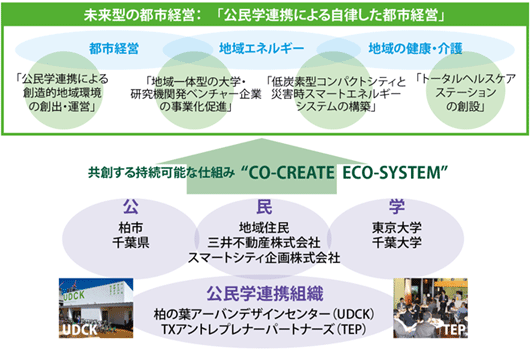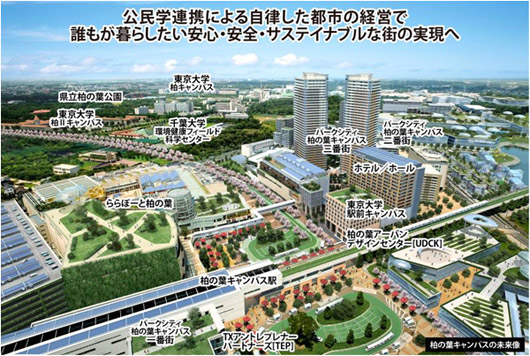Kashiwanoha Campus–a Joint Project between Government, Private-enterprise, and Academia
Designated by the Japanese Government as a “Comprehensive Special Zone”–a Key Element of Japan’s New Growth Strategy
–Comprehensive Government Support for Creation of Smart Cities, Cities of Health and Longevity, and Cities of New Industry Creation–
December 22, 2011
Kashiwa City, Mitsui Fudosan Co., Ltd. Smart City Planning, Inc.
Urban Design Center Kashiwa-no-ha, TX Entrepreneur Partners
Mitsui Fudosan Co., Ltd. announced today that the government of Japan has adopted a joint proposal by Mitsui Fudosan and three partners, Smart City Planning, Inc., Urban Design Center Kashiwa-no-ha (UDCK) and TX Entrepreneur Partners, to make Kashiwa city into a “Comprehensive Special Zone for Regional Revitalization (Comprehensive Special Zone).”
The Comprehensive Special Zone system was established by the government as part of its new growth strategy. Under the system, designated areas will receive comprehensive support through special treatment, mainly through deregulation, and tax, fiscal and financial support. The objective is to stimulate international competitiveness and revitalize the local communities in these areas. A total of 33 districts have been designated as comprehensive special areas, 7 as strategic areas to stimulate international competitiveness, and 26 as areas for regional revitalization.
Under the concept "New Style for the Next," Mitsui Fudosan and its collaborators aim to build a city at Kashiwanoha Campus that presents the world with model solutions for the increasingly complex challenges facing modern society. The theme for the proposal for the Kashiwanoha Campus comprehensive special zone is autonomous urban management based on a partnership between the public, private and academic spheres. The proposal offers a 3-way solution for energy, health and caregiving, and their supporting urban management structures, to be achieved through new initiatives, essential deregulation and tax support.
As regards energy, the proposal aims to achieve autonomous regional energy management. Taking advantage of special regulatory provisions, the project will feature a system for storing energy generated by solar power generation and other methods in a large-scale energy storage unit. In times of disaster or supply interruption, all districts in the region will share their energy, giving priority to supplying emergency shelters, bore water pumps, and high-rise condominium elevators. The system effectively ensures a three-day (72 hour) lifeline for the area.
In healthcare and caregiving, the project aims to build a community that can autonomously provide support for its members’ vibrant day-to-day living. Specifically, the project will seek to enable the establishment of a rehabilitation services center that is not a formal healthcare institution, and create a Total Healthcare Station providing comprehensive services for disease prevention and maintaining independence as well as nutritional and oral care. Other programs run by the center include a training course for more energetic seniors, which offers them a way to contribute to regional health services as “Resident Health Supporters.”
In urban management, the aim is to realize a vibrant urban space where people in the local area can themselves find opportunities to create new industries and employment. To this end, the project will establish local rules within which an area management organization will conduct road maintenance and management. Monetary contributions to the area management organization will be subject to preferential tax treatment, and the angel tax credit system will be strengthened.
As the partnership between government, private-sector enterprise, and academia continues to make steady progress, Mitsui Fudosan and its partners will ramp up these initiatives to promote Kashiwanoha Campus city as model for the "New Style for the Next" throughout Japan, Asia, and the world.


